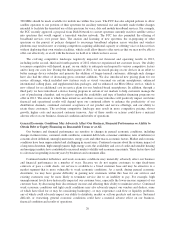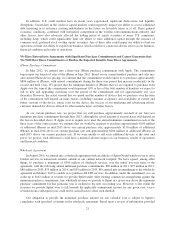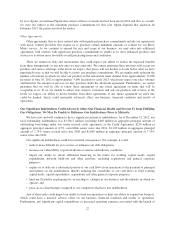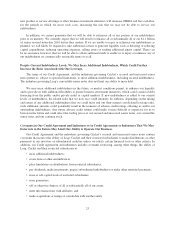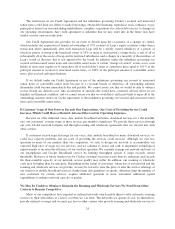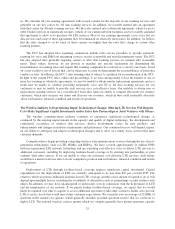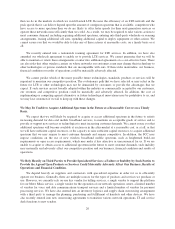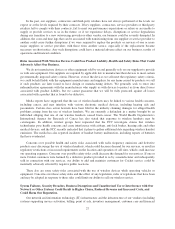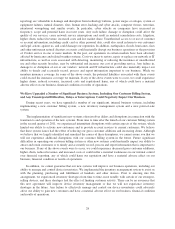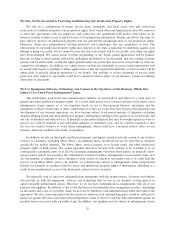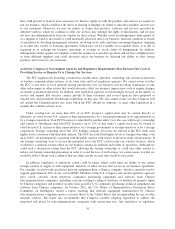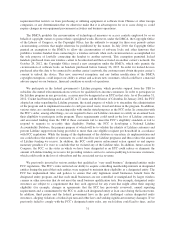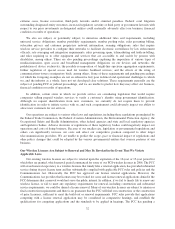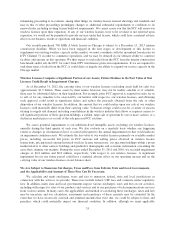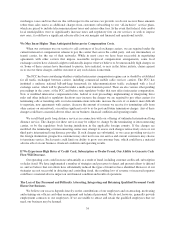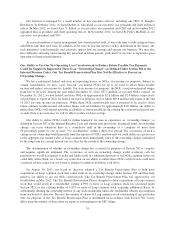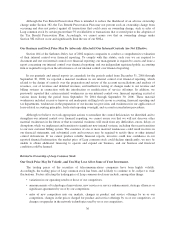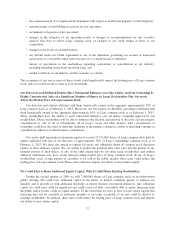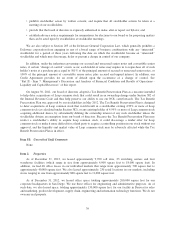Cricket Wireless 2012 Annual Report Download - page 44
Download and view the complete annual report
Please find page 44 of the 2012 Cricket Wireless annual report below. You can navigate through the pages in the report by either clicking on the pages listed below, or by using the keyword search tool below to find specific information within the annual report.that could prevent or make it more expensive for them to supply us with the products and services we require to
run our business, which could have the effect of slowing or limiting our ability to introduce products and services
to our customers. Moreover, we may be subject to claims that products, software and services provided by
different vendors, which we combine to offer our services may infringe the rights of third parties, and we may
not have any indemnification from our vendors for these claims. Whether or not an infringement claim against us
or a supplier is valid or successful, it could materially adversely affect our business, financial condition or results
of operations by diverting management attention, involving us in costly and time-consuming litigation, requiring
us to enter into royalty or licensing agreements (which may not be available on acceptable terms, or at all) or
requiring us to redesign our business operations or systems to avoid claims of infringement. In addition,
infringement claims against our suppliers could also require us to purchase products and services at higher prices
or from different suppliers and could adversely affect our business by delaying our ability to offer certain
products and services to our customers.
Action by Congress or Government Agencies and Regulatory Requirements May Increase Our Costs of
Providing Service or Require Us to Change Our Services.
The FCC regulates the licensing, construction, modification, operation, ownership, sale and interconnection
of wireless communications systems, as do some state and local regulatory agencies. We cannot assure you that
the FCC or any state or local agencies having jurisdiction over our business will not adopt regulations or take
other enforcement or other actions that would adversely affect our business, impose new costs or require changes
in current or planned operations. In addition, state regulatory agencies are increasingly focused on the quality of
service and support that wireless carriers provide to their customers and several agencies have proposed or
enacted new and potentially burdensome regulations in this area. We also cannot assure you that Congress will
not amend the Communications Act, from which the FCC obtains its authority, or enact other legislation in a
manner that could be adverse to us.
Under existing law, no more than 20% of an FCC licensee’s capital stock may be owned, directly or
indirectly, or voted by non-U.S. citizens or their representatives, by a foreign government or its representatives or
by a foreign corporation. If an FCC licensee is controlled by another entity (as is the case with Leap’s ownership
and control of subsidiaries that hold FCC licenses), up to 25% of that entity’s capital stock may be owned or
voted by non-U.S. citizens or their representatives, by a foreign government or its representatives or by a foreign
corporation. Foreign ownership above the 25% holding company level may be allowed if the FCC finds such
higher levels consistent with the public interest. The FCC has ruled that higher levels of foreign ownership, even
up to 100%, are presumptively consistent with the public interest with respect to investors from certain nations. If
our foreign ownership were to exceed the permitted level, the FCC could revoke our wireless licenses, which
would have a material adverse effect on our business, financial condition and results of operations. Although we
could seek a declaratory ruling from the FCC allowing the foreign ownership or could take other actions to
reduce our foreign ownership percentage in order to avoid the loss of our licenses, we cannot assure you that we
would be able to obtain such a ruling or that any other actions we may take would be successful.
In addition, legislative or regulatory action could be taken, which could limit our ability to use certain
foreign vendors to supply us with equipment, materials or other services that we use in our business operations.
For example, we previously purchased network equipment from a Chinese company, which is currently used to
support approximately 20% of our covered POPs. Members of the U.S. Congress and certain regulatory agencies
have raised concerns about American companies purchasing equipment and software from Chinese
telecommunications companies, including concerns relating to alleged violations of intellectual property rights
by Chinese companies and potential security risks posed by U.S. companies purchasing technical equipment and
software from Chinese companies. In October 2012, the U.S. House of Representatives Permanent Select
Committee on Intelligence issued a report asserting that network equipment manufactured by Chinese
telecommunications companies poses a security threat to the United States and recommending the use of other
network vendors. The report also recommends that Congress consider adopting legislation to address the
purported risk posed by telecommunications companies with nation-state ties. Any legislative or regulatory
30


